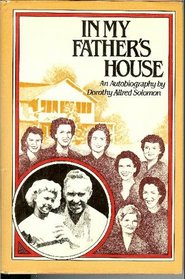Helpful Score: 2
This is a book full of love, written by the daughter of a Mormon (not mainstream, of course) man who believed in "The Principle" and had many wives. You can see both the pain caused to wives and chidren by adherence to this way of life and also see the beauty of some human characters. The author ended up rejecting polygamy, but regaining her love for all of her huge family.
Helpful Score: 2
Good book on Mormonism and the secrets of multiple wifes.
Helpful Score: 2
An autobiography of Dorothy Allred Solomon, a woman who was raised in a polygamist household. Unusual in that it is a very sympathetic portrayal of polygamists and polygamy. She had seven mothers, all of them loving and caring, a loving father, and 47 brothers and sisters. Other than the prejudices of the outside world, hers was a happy childhood.
The author was raised in a family with 7 âmothersâ and a father who was the revered leader of a polygamous community. Not mainstream Mormon but devout fundamentalists â" part of an underground group of communities that continued to live their polygamous life style generations after it was outlawed by both the Mormon church and the state of Utah in 1890.
Ms Solomon had a happy childhood although it was filled with all the fears of having her parent's lifestyle discovered and exposing the entire family to harassment and the possible arrest of her father. She ultimately rejects polygamy for herself but this does not lessen her love for her very large family
The author does a wonderful job retelling the story of her life.
Ms Solomon had a happy childhood although it was filled with all the fears of having her parent's lifestyle discovered and exposing the entire family to harassment and the possible arrest of her father. She ultimately rejects polygamy for herself but this does not lessen her love for her very large family
The author does a wonderful job retelling the story of her life.
This book gives you a look into the sick life of polygamous mormon religion or cult. This story makes you feel sorry for the children growing up in these families. I can't imagine being willing to put up with this sick arrangement and they called it religion? As Dorothy states more like a power struggle! This book at times especially toward the end was difficult to get through. It left me thinking these women were definitly psychologically in need of help. It also reminded me of Patti Hearst and Jim Jones.The last two chapters were better and




